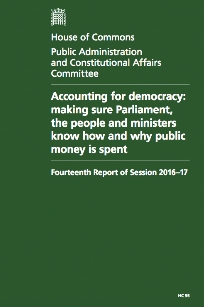Technical update: accounting for democracy

How many of you are aware of the accounting for democracy movement? Perhaps disappointingly, this does not involve thousands of accountants protesting in Westminster waving banners declaring everybody’s basic right to double-entry book-keeping, writes Steve Brown. But it does involve pressure being brought on government to revamp departmental annual reports and accounts and turn them into the democratic scrutiny tools they are intended to be.
 There’s a bit of a story to tell here for those not up to speed. In 2017, the Public Administration and Constitutional Affairs Committee (PACAC) published a report on the back of an inquiry into government accounts. Its report – Accounting for democracy: making sure Parliament, the people and ministers know how and why public money is spent – made a number of bold claims. But, in essence, it said that current government annual reports and accounts were not meeting the needs of the public or Parliament.
There’s a bit of a story to tell here for those not up to speed. In 2017, the Public Administration and Constitutional Affairs Committee (PACAC) published a report on the back of an inquiry into government accounts. Its report – Accounting for democracy: making sure Parliament, the people and ministers know how and why public money is spent – made a number of bold claims. But, in essence, it said that current government annual reports and accounts were not meeting the needs of the public or Parliament.
The committee said many departmental government reports were badly written and difficult to follow – despite being prepared to a high technical standard. Even organisations like the King’s Fund and TaxPayers’ Alliance found them difficult to use and academics said the format had not been designed for the purpose of democratic scrutiny. The Plain English Campaign’s written submission said one extract from a departmental annual report was ‘truly terrible’ and that ‘the full documents are not always as bad as these excerpts suggest, but are consistently badly written and in serious need of a rewrite’. Damning stuff.
The report made several recommendations. For example, accounts should enable Parliament to scrutinise ‘how actual spending and activity compared to financial commitments announced to Parliament in press releases or through the media to spend on or cut particular programmes or policy priorities’. Audits were suggested for performance data to improve trust in these announcements. There should be more plain English, named contacts to explain accounts’ contents and the inclusion of public sector unit costs for key services.
The committee was kept waiting a year for a response. Even making some allowance for last year’s general election and the dissolution of Parliament, this goes some way beyond the usual expectation that the government will respond to committee reports within two months.
And it is a disappointing response too, according to the PACAC, which published an update over the summer, as it fails to respond to individual recommendations.
Instead, the committee said, it addresses just some of the points in a narrative response, although it does propose a Treasury review of annual reports and accounts. The committee is treating the response as interim and is holding out for a formal response to the original report that addresses all recommendations.
While the government has offered support for the overall aims of the report, it does not acknowledge that accounts’ objectives are not being met and has highlighted areas where it disagrees with the report. In particular, it does not believe that annual accounts are the place to track ministerial commitments.
The committee, however, is adamant this should be considered by the Treasury’s further review of accounts – claiming that in 198 of 209 government announcements in 2017, it was unclear what year money would be spent in. And too often it was unclear when new money was being offered or existing money reallocated.
So what are the implications of this democratic movement? If the PACAC gets its way – following the Treasury review – a bigger burden could be placed on departments to include more detail in their annual report and accounts as well as improve the clarity of contents.
It is also possible this could have an impact on local public bodies. If the Department of Health and Social Care has to justify money was spent on an intended purpose – not just handed out with that aim – that could place new reporting requirements on NHS providers and commissioners.
And it may even lead to increased scrutiny and more onerous requirements on local bodies when bidding for central funds for specific initiatives. Watch this space.
Also in technical this month
Technical review: NHS charities; ICD11; innovation payments; education resource groups; and patient-level costing
NICE update: cardiac rehab push for heart failure
NHS in numbers: capital spending
Related content
The Institute’s annual costing conference provides the NHS with the latest developments and guidance in NHS costing.
The value masterclass shares examples of organisations and systems that have pursued a value-driven approach and the results they have achieved.